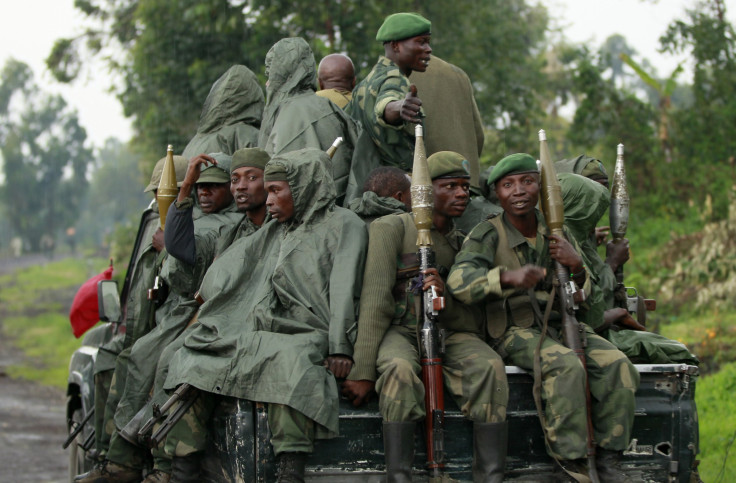UN Scores Military Victory Against M23 in Congo, But That's Only Part Of The Solution

Military troops and UN peacekeeping forces in the Democratic Republic of the Congo have made unprecedented gains against rebel fighters in Goma, a troubled city on the country's eastern border. This could be a a new opportunity for peace talks between various actors in the volatile region -- but after decades of failed negotiations and ongoing violence, some analysts warn that the same old approach won't yield lasting change.
The rebel group M23 was driven from its position -- the town of Kabati, which overlooks Goma -- on Friday by DR Congo troops and a UN intervention brigade, which continued to pursue the militia even further afield through the weekend. It was the first time UN peacekeepers in the region have used their recently enhanced mandate in full combat.
M23 first seized Goma in November, and thousands of UN peacekeepers already stationed there were criticized for their inability to stop the takeover. Facing international pressure and administrative difficulties, the militants left town after only ten days of occupation. But M23 has remained a threat, and sporadic clashes continued to erupt.
"When there is a military victory like this, it is a chance to advance with a political solution, and that is better for a durable peace," said envoy Mary Robinson, a former Irish prime minister, to Reuters.
But this 'durable peace' could prove elusive; M23 is only the most recent incarnation of a deadly conflict that has simmered for decades. The group coalesced in 2012 but is rooted in an older insurgency, the National Congress for the Defense of the People, which first mobilized in 2004 but was absorbed into the DR Congo army in an ill-fated March 23, 2009 agreement that would give M23 its name.
It is widely believed that Rwanda, and to a lesser extent Uganda, is backing M23 in hopes of destabilizing the DR Congo and laying claim to the valuable minerals that enrich the country's lawless eastern territories. Both countries deny these allegations. Rwanda was nearly drawn into the conflict last week when shelling from the DR Congo spilled across the Rwandan border, killing one woman. The incident occurred while troops were battling M23; Rwanda claims it was intentional.
The relationship between Rwanda and the DR Congo is deeply fraught and endlessly complicated by years of political conflicts. Today's ongoing clashes are overshadowed by memories of the 1994 Rwandan genocide that killed more than 500,000 people there, stirring up ethnic tensions that contributed to two wars pitting Rwanda and Uganda against the DR Congo and its allies between 1996 and 2003, killing millions.
Inside the DR Congo, meanwhile, a government of questionable legitimacy in the western capital city of Kinshasa has been largely unable to enforce security across the vast countryside. In this power vacuum, a kaleidoscope of militant groups continues to assert control over swathes of land and commit human rights abuses against civilians.
Against this backdrop, several domestic, regional and international powers have attempted to broker peace agreements -- some seeking short-term resolutions, others attempting to lay a framework for long-term stability. The most recent of these was the Peace, Security and Cooperation Framework for the Democratic Republic of the Congo, signed in February, which set out a broad -- if vague -- plan for international and domestic cooperation. But clashes have been ongoing since then.
A recent, well-received report from a conference of Congolese, southern African and international experts argued that top-down approaches to the DR Congo's most endemic problems aren't enough.
"The Congolese must develop their own solutions to conflict minerals rather than adopting solutions that are given to them by the international community without proper consultation, since these are difficult to implement," found the report, adding that "Congolese civil society groups should strive to claim ownership of existing structures that are designed to tackle the conflict mineral trade, and seek to popularize them in order to contribute to the promotion of peace."
The conflicts that have long stymied development in the poverty-stricken DR Congo are driven by mineral wealth and worsened by a lack of political stability -- and these are largely local problems. So while military victories and international treaties may be part of the solution, the empowerment of Congolese citizens, experts and civil society groups will be paramount. Rwanda and Uganda will also have to be involved, though they still deny backing M23.
For citizens of Goma, the most immediate goal is get back to life as usual. One young cloth vendor told Voice of America this weekend that the the government has a role to play in brining stability back to her hometown. "We want the government to finish the war," she said. "Then we can get clients to buy our fabrics and we can live peacefully."
© Copyright IBTimes 2024. All rights reserved.











